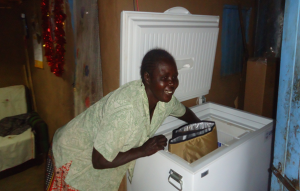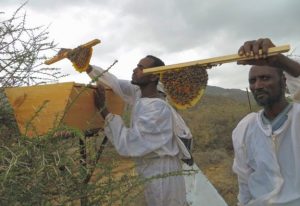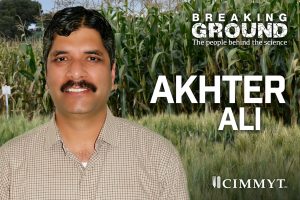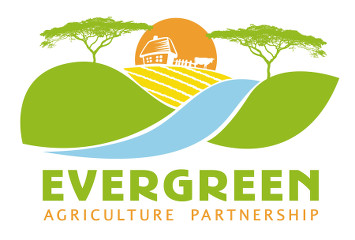 “FMNR has taught us the knowledge of taking care of trees but now we have gained from increased pasture and milk production. I am happy as a farmer, having been recognized. I am able to pay school fees for my children without panic. Through FMNR, I have also been chosen as committee member in the Ngusero water project committee, chosen to represent Baringo County women in development matters in my village. I did not ever think I could be chosen for such (a project). I am proud of FMNR as it has molded me as community leader. FMNR has changed my life.” states Nancy, an FMNR champion farmer.
“FMNR has taught us the knowledge of taking care of trees but now we have gained from increased pasture and milk production. I am happy as a farmer, having been recognized. I am able to pay school fees for my children without panic. Through FMNR, I have also been chosen as committee member in the Ngusero water project committee, chosen to represent Baringo County women in development matters in my village. I did not ever think I could be chosen for such (a project). I am proud of FMNR as it has molded me as community leader. FMNR has changed my life.” states Nancy, an FMNR champion farmer.
Monthly Archives: March 2017
FMNR brings economic empowerment for women in Kenya: Nancy’s story
From desperation comes hope: FMNR in Somaliland
 Even for a dry region like Somaliland there is hope for a better life and as bad as the drought is, it is also an opportunity for people to think of alternate livelihood strategies. Many pastoralists are now ready to settle down and grow fruits and vegetables. World Vision supports this new thinking and has developed a regenerative reforestation method called Farmer Managed Natural Regeneration (FMNR). Some communities now support this method and despite the drought and barren soil, there are astonishing results.
Even for a dry region like Somaliland there is hope for a better life and as bad as the drought is, it is also an opportunity for people to think of alternate livelihood strategies. Many pastoralists are now ready to settle down and grow fruits and vegetables. World Vision supports this new thinking and has developed a regenerative reforestation method called Farmer Managed Natural Regeneration (FMNR). Some communities now support this method and despite the drought and barren soil, there are astonishing results.
Sustainable Land Management Practices: A focus on Parkland Agroforestry

This video on Sustainable Land Management in Africa looks at the use of parkland agroforestry as part of effective and sustainable integrated farming. Click here to watch the video
World Bank Group President Calls for Urgent Action on Hunger Crisis
Originally published on the World Bank Group website.
World Bank Group President Jim Yong Kim issued the following statement on the devastating levels of food insecurity in sub-Saharan Africa and Yemen:
“Famine is a stain on our collective conscience. Millions of lives are at risk and more will die if we do not act quickly and decisively.
We at the World Bank Group stand in solidarity with the people now threatened by famine. We are mobilizing an immediate response for Ethiopia, Kenya, Nigeria, Somalia, South Sudan, and Yemen. Our first priority is to work with partners to make sure that families have access to food and water. We are working toward a financial package of more than $1.6 billion to build social protection systems, strengthen community resilience, and maintain service delivery to the most vulnerable. This includes existing operations of over $870 million that will help communities threatened by famine. I am also working with our Board of Directors to secure the approval of new operations amounting to $770 million, funded substantially through IDA’s Crisis Response Window.
The World Bank Group will help respond to the immediate needs of the current famine, but we must recognize that famine will have lasting impacts on people’s health, ability to learn, and earn a living. So we will also continue to work with communities to reclaim their livelihoods and build resilience to future shocks.
We are coordinating closely with the UN and other partners in all areas of our response. We know that resolution to this acute crisis will not be possible without all humanitarian and development actors working together. We call on the international community to respond robustly and quickly to the UN global appeal for resources for the famine.
To prevent crises in the future, we must invest in addressing the root causes and drivers of fragility today and help countries build institutional and societal resilience.”
Background
A famine means that a significant part of the population has no access to basic food, suffers from severe malnutrition, and death from hunger reaches unprecedented levels. Children under five are disproportionately affected. A famine can affect the well-being of a whole generation. Famine was officially declared on February 20 in South Sudan, impacting approximately 100,000 people, and there is a credible risk of other famines in Yemen, Northeast Nigeria, and other countries. Ongoing conflicts and civil insecurity are further intensifying the food insecurity of millions of people across the region, and there is already widespread displacement and other cross-border spillovers. For instance, food insecurity in Somalia and famine in South Sudan are accelerating the flow of refugees into Ethiopia and Uganda. The UN estimates that about 20 million people in Nigeria, South Sudan, Somalia and Yemen are on the “tipping point” of famine. Drought conditions also extend to Uganda and parts of Tanzania. The last famine was declared in 2011 in Somalia during which 260,000 people died.
Women in Agriculture: The Agents of Change for the Global Food System
Originally published on the World Bank Group website.

As the global community works toward achieving the Sustainable Development Goals (SDGs) — among them, SDG2, which aims to end hunger and malnutrition by 2030 — women can be the key agents of change in agriculture, nutrition and rural development. With better access to information, training, and technology, women can alter food production and consumption so that land and resources are used sustainably.
For International Women’s Day, the World Bank is shining a spotlight on women who exemplify this year’s theme: #BeBoldForChange. In field visits and projects, we have met women who are the change agents in their villages and communities. Whether they work on a farm or in a lab, women around the world are transforming agriculture to be more resilient and sustainable..
cick here for the fuu
Breaking Ground: Akhter Ali helps transform agriculture sector in Pakistan
Originally published on the CIMMYT website.
 Akhter Ali always knew he wanted to have an impact on the livelihoods of farmers in Pakistan. “I come from a farmer family – the poverty and inequality of rural communities always disturbed me,” said Ali, who was born in Multan district, Pakistan. “I knew from a young age I wanted to do something to help my community and the rural poor throughout my country.”
Akhter Ali always knew he wanted to have an impact on the livelihoods of farmers in Pakistan. “I come from a farmer family – the poverty and inequality of rural communities always disturbed me,” said Ali, who was born in Multan district, Pakistan. “I knew from a young age I wanted to do something to help my community and the rural poor throughout my country.”
Ali, an agricultural economist at the International Maize and Wheat Improvement Center (CIMMYT), is working to sustainably increase agricultural productivity and incomes for farmers through the Agricultural Innovation Program (AIP), an initiative funded by the U.S. Agency for International Development to build up the country’s agriculture sector through the development and dissemination of new agriculture technologies.

